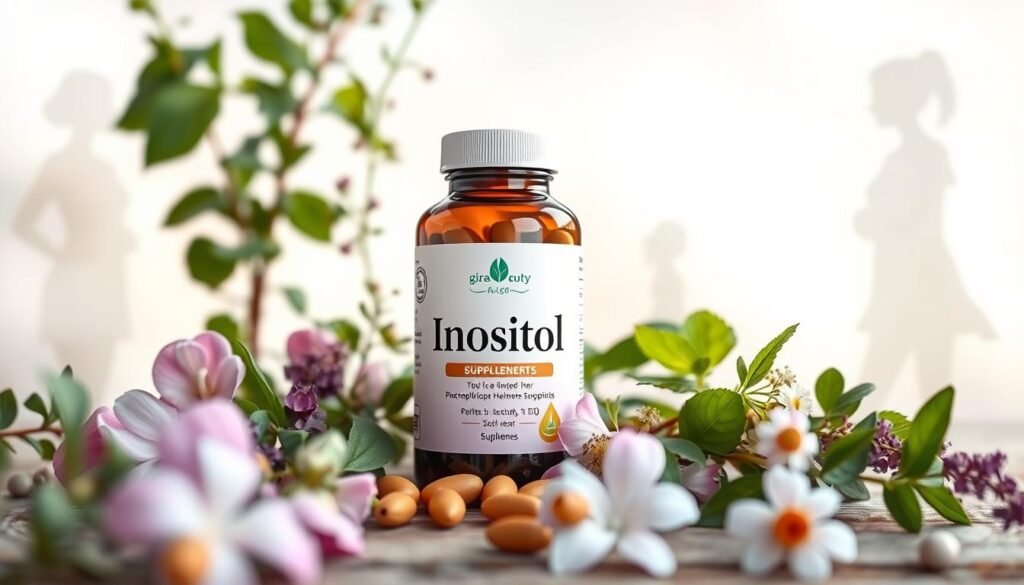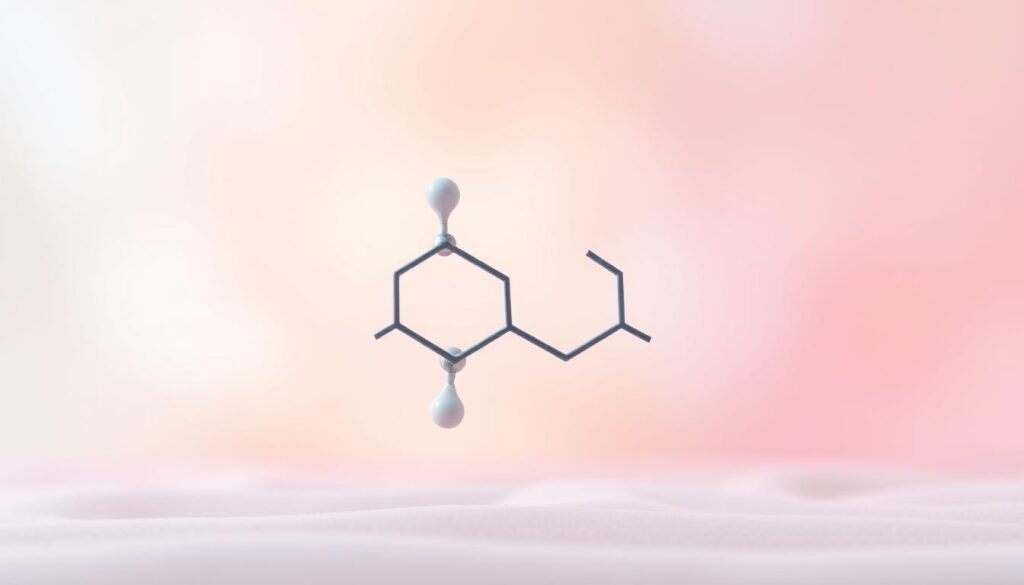Did you know that up to 80% of people with PCOS experience fertility challenges? This is a big issue. Polycystic Ovary Syndrome (PCOS) affects nearly 20 percent of women globally. It’s a complex hormonal disorder that can mess up lots of bodily functions.
It leads to problems like insulin resistance, irregular periods, and weight gain. Inositol supplements have risen as a natural solution. They mainly target hormonal imbalances and boost metabolic health. Inositol comes in two main forms—myo-inositol (MI) and D-chiro-inositol (DCI). These help control hormones, better insulin sensitivity, and manage PCOS symptoms.
Although inositol isn’t a cure for PCOS, its benefits in PCOS treatment are significant. It offers hope to many dealing with this condition.
Key Takeaways
- Inositol supplements can significantly alleviate symptoms of PCOS.
- A 40:1 ratio of myo-inositol to D-chiro-inositol is optimal for improving ovulation rates.
- These supplements help improve insulin sensitivity and lower blood sugar levels.
- Taking inositol may lower the risk of gestational diabetes during pregnancy.
- Continued use can help maintain hormonal balance in women with PCOS.
Understanding PCOS and Its Symptoms
Polycystic Ovary Syndrome (PCOS) is a common hormonal disorder among women. It is marked by symptoms such as irregular periods, ovarian cysts, and high androgen levels. Because these symptoms can differ greatly, diagnosing and treating PCOS can be challenging.
The usual symptoms of PCOS are:
- Irregular or absent menstrual periods
- Excess hair growth, known as hirsutism
- Acne and oily skin
- Weight gain
Hormone imbalances often cause PCOS, which might trigger insulin resistance. This means the body struggles to use insulin correctly. Hormone imbalances can also make PCOS symptoms worse. So, understanding these symptoms is key to finding them early and managing them.
Being aware of PCOS is crucial. A timely diagnosis can greatly better someone’s quality of life and reproductive health. Women with any of these symptoms should talk to a healthcare provider. They will get a full evaluation and learn about their treatment options.
| PCOS Symptoms | Description |
|---|---|
| Irregular Menstrual Cycles | Cycles may be prolonged or absent |
| Ovarian Cysts | Fluid-filled sacs on the ovaries |
| Hirsutism | Excess hair growth in areas where men typically grow hair |
| Acne | Persistent skin breakouts |
| Weight Gain | Often occurs around the abdomen |
What Are Inositol Supplements?
Inositol is a kind of natural sugar important for cell functions and signals. It’s often called vitamin B8. Each day, our bodies make about 1 gram of inositol from food and body processes. People are looking into inositol supplements for conditions like polycystic ovary syndrome (PCOS), because they might help.
There are two main types of inositol for supplements: myo-inositol and D-chiro-inositol. You can find these supplements in powder or pill form. Studies say our bodies usually have a myo-inositol to D-chiro-inositol ratio of about 40:1. But for those with PCOS, this ratio might be much higher. Taking a balanced inositol supplement could improve insulin sensitivity, which helps with PCOS symptoms.
Research shows that inositol supplements can regulate blood sugar and insulin. They may work as well as Metformin, a common PCOS drug, in making bodies more sensitive to insulin. This helps with menstrual cycles, fertility, and lowers androgens. Androgens are hormones that can cause acne and unwanted hair growth.
Some early studies also find inositol might ease anxiety and depression in PCOS patients. It could also boost fertility and improve the quality of eggs. This is good news for those trying fertility treatments like IVF.
In a nutshell, supplements with myo-inositol and D-chiro-inositol could be key in managing PCOS. They offer a hopeful treatment for metabolic and hormonal problems, improving health and happiness.
Inositol Supplements for PCOS: Benefits and How They Work
Inositol supplements are praised for aiding with PCOS. They specifically help with insulin sensitivity. Studies show that myo-inositol can regulate menstrual cycles and improve ovulation. It enhances egg quality for those with PCOS. This is key for hormone balance and reproductive health. Insulin resistance, often seen in PCOS, can lead to complications. Tackling this can lessen the risk of gestational diabetes.
A major study covering nine trials and 496 people found big benefits from myo-inositol. It notably dropped fasting insulin levels. There was also a decrease in insulin resistance, showing better insulin sensitivity. Additionally, testosterone levels slightly fell while a vital hormone increased. This signals an overall hormonal improvement.
Myo-inositol works well with fertility boosters like folic acid. Using them together has uplifted fertility treatments. 2000 mg of myo-inositol and 200 μg of folic acid, used twice daily, bettered egg quality. This mix also cut down the risk of ovarian issues. It’s key for improving fertility in PCOS treatment plans.
Myo-inositol supports metabolic health too. It positively alters glucose to insulin ratios and aids cholesterol management. These benefits show myo-inositol’s role in fertility and metabolic health. High doses even help with PCOS-related skin issues. It offers a full approach to tackling PCOS.
Adding myo-inositol to a complete PCOS care strategy can boost one’s metabolic and reproductive health. By also adopting dietary and lifestyle changes, overall health can greatly improve.

How Inositol Affects Insulin Resistance in PCOS
Many women with PCOS struggle with insulin resistance. This issue makes their body’s cells less responsive to insulin, leading to high blood sugar. It also worsens symptoms like high blood pressure and abnormal cholesterol levels. Managing insulin sensitivity is key for their well-being.
Understanding Insulin Resistance
Up to 80% of women with central obesity and PCOS face insulin resistance. But, it’s not limited to them; 15% to 30% of lean women have the issue too. Insulin is crucial for blood sugar regulation. When its response fails, hormonal balance and metabolic health suffer.
Impact of Inositol on Blood Sugar Levels
Inositol, especially myo-inositol, effectively improves insulin’s work. Studies show it can decrease blood sugar and insulin levels. This supports managing metabolic syndrome symptoms in women with PCOS.
Taking inositol supplements can also aid reproductive health. It’s a dual-purpose solution, appealing to those trying to conceive. To learn more about inositol’s role in ovulation and fertility for PCOS, check out this resource.

The Role of Myo-Inositol and D-Chiro-Inositol
Myo-inositol and D-chiro-inositol are key for managing polycystic ovary syndrome (PCOS). Over 7% of women of childbearing age suffer from PCOS. Knowing about these inositol forms is crucial for those looking into fertility supplements. They help with hormone balance and boosting reproductive health.
Importance of Myo-Inositol
Myo-inositol helps make ovaries work normally and improves the quality of eggs. It can lower androgen levels, like testosterone, which matters for women with PCOS. The best ratio of myo-inositol to D-chiro-inositol for them is about 40:1.
This helps make menstrual cycles better. Also, it reduces the need for high follicle-stimulating hormone (FSH) doses in fertility treatments.
Role of D-Chiro-Inositol
D-chiro-inositol boosts how well myo-inositol works by improving insulin sensitivity. Insulin resistance is a big problem in 30% to 40% of women with PCOS. It makes the benefits of myo-inositol on reproductive health even stronger. A right mix of both forms is crucial for women with PCOS.
This combination offers a full strategy for managing PCOS symptoms and enhancing fertility.

Myo-inositol and D-chiro-inositol are great for fertility. They help restore balance and improve reproductive health. For more on their benefits, visit this informative resource.
Benefits of Inositol for Ovulation Induction
Inositol supplements, mainly myo-inositol, are known for aiding ovulation induction. This is vital for women with polycystic ovary syndrome (PCOS). Myo-inositol helps encourage regular ovulation cycles. This is key for those trying to get pregnant. Women taking these fertility aides often see their menstrual cycles become more regular. This is a big hurdle for those with PCOS.
Myo-inositol plays a role in supporting hormonal balance. It lowers testosterone levels and improves the LH to FSH ratio. This is important for ovulation and reproductive health. Plus, inositol boosts insulin sensitivity, which aids ovarian function and ovulation.
In assisted reproductive technologies like in vitro fertilization (IVF), myo-inositol helps improve embryo quality. It also raises clinical pregnancy rates. For those with PCOS, converting inositol from food into a usable form might not work well. So, supplements could be very helpful.
| Study Findings | Outcome |
|---|---|
| Myo-inositol supplementation improves ovulation rates compared to placebo. | Increased ovulation and potential pregnancy rates. |
| Lower testosterone levels and balanced LH/FSH ratios after 12 weeks of supplementation. | Enhanced hormonal balance, fostering ovulation. |
| Improved insulin sensitivity among women with PCOS. | Better management of menstrual cycles and ovulation. |
| Combining myo-inositol with IVF treatment improves oocyte quality. | Higher chances of successful conception. |
In summary, inositol is an effective aid for ovulation induction, especially for those with PCOS. It positively influences hormonal balance, menstrual regularity, and fertility. This makes it a great addition to fertility treatments. It offers hope for better reproductive health.
Dosage Recommendations for Inositol Supplements
Inositol supplements help manage polycystic ovary syndrome (PCOS) symptoms. It’s crucial to know the right dosage for the best results. Dosage varies based on personal health needs and product instructions.
Optimal Dosages for PCOS Treatment
For PCOS, a mix of myo-inositol and D-chiro-inositol is best. Usually, 4000 mg of myo-inositol is taken in two parts a day. And for D-chiro-inositol, the daily amount is between 600 mg to 1000 mg.
This combo includes 4000 mg of myo-inositol and 100 mg of D-chiro-inositol. It copies the body’s natural ratio in healthy ovaries, making it more effective. It’s best to take these supplements before eating to help with absorption.
Even though a proper diet can provide enough inositol, supplements are a good way to keep balanced nutrition for PCOS. Talking with a healthcare provider is advised. They can suggest specific dosages for managing PCOS symptoms better.
Potential Side Effects and Safety Considerations
Learning about the side effects of inositol supplements is key for potential users. They are usually safe within the advised doses. However, some people might have mild side effects. These include stomach issues and headaches.
Common Side Effects
Side effects from inositol vary among users. Most people don’t have major problems. But, some common side effects include:
- Gastrointestinal upset, like nausea or bloating
- Headaches or migraines
- Dizziness or fatigue
- Possible mood changes in sensitive individuals
Knowing about these effects helps users watch for changes. This way, they can make safe choices about their supplement use.
Who Should Avoid Inositol?
Some people should be careful with inositol. Safety considerations matter if you have health issues or take certain meds. This includes:
- Those with hormonal or endocrine disorders
- Someone on hormone-affecting drugs
- Pregnant or nursing moms, without doctor approval
Talking to a healthcare provider first is a must. This ensures the supplement is a good fit for you. It’s a way to avoid bad effects and stay healthy.
Conclusion
Inositol supplements offer hope to those dealing with PCOS. Studies show they help in hormone regulation and metabolic health. They are becoming popular for those needing safe treatment options.
Looking into thirty trials with 2230 participants, inositol showed benefits for metabolism. Though metformin may do better in certain cases, inositol stands out for having fewer side effects. For more details, take a look at the Journal of Clinical Psychiatry.
Talking to healthcare providers before starting inositol is key. They will guide dosage and treatment based on your health. Inositol doesn’t just help with reproduction—it can greatly improve life quality for PCOS patients.